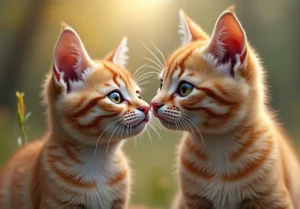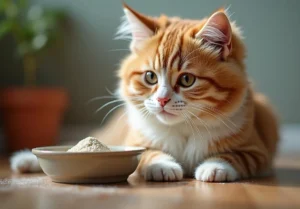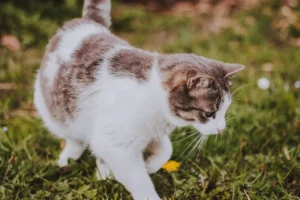Cats have a reputation for being incredibly clean animals, constantly grooming themselves throughout the day. But have you ever wondered why cats are so meticulous about staying clean? In this blog post, we will explore the reasons behind feline hygiene habits.
Feline Hygiene: An Instinctual Behavior
Cats’ remarkable cleanliness stems from their instinctual behavior, honed over centuries of evolution. Grooming is not merely a habit, but a vital part of a cat’s survival toolkit. In the wild, cleanliness is essential for stealth during hunting and evading predators. Cats instinctively groom themselves regularly to remove dirt, parasites, and odors that could give away their presence. This ingrained behavior ensures that cats remain healthy and undetected in their natural environment.
Self-Cleaning Mechanism: The Importance of Grooming
Grooming is more than just keeping a cat’s coat clean—it’s a multi-purpose activity crucial for their well-being. Regular grooming helps regulate a cat’s body temperature by spreading natural oils evenly across their fur. This not only protects their skin but also provides insulation in both cold and hot weather. Additionally, grooming aids in blood circulation, helping to maintain a healthy coat and skin. Beyond physical benefits, grooming is also a stress-reliever for cats, promoting relaxation and comfort in their daily lives.
Benefits of Grooming:
- Stress Reduction: Grooming promotes relaxation and reduces anxiety in cats.
- Improved Circulation: Regular grooming enhances blood flow, keeping cats healthy.
- Bonding: Mutual grooming among cats fosters social bonds and relationships.
- Skin Health: Grooming removes dead cells, preventing skin issues and infections.
- Temperature Regulation: Even distribution of oils through grooming helps cats adapt to various climates.
By understanding the instinctual nature and essential role of grooming in a cat’s life, we can better appreciate the remarkable cleanliness of these fascinating feline creatures.
Minimalistic Lifestyle: A Preference for Cleanliness
Cats are natural-born neat freaks, with a strong preference for cleanliness embedded in their DNA. They meticulously groom themselves to maintain their pristine appearance, spending hours each day licking their fur into sleek perfection. This behavior stems from their wild ancestors, who needed to keep clean to avoid predators and stay stealthy in the hunt. So, if you ever wonder why your feline friend always looks so put together, it’s simply because cleanliness is deeply ingrained in their nature.
Sensory Stimulation: A Multi-Purpose Ritual
Grooming isn’t just a hygiene routine for cats; it serves multiple purposes that go beyond mere cleanliness. When a cat licks itself, it’s not just getting rid of dirt and parasites, but also leaving behind scent markers that communicate messages to other felines. This scent marking helps cats establish territory boundaries and social hierarchies. Additionally, grooming provides mental stimulation and stress relief for cats, similar to how humans might find comfort in a relaxing spa day. So, the next time you catch your cat in a grooming session, know that it’s engaging in a multi-functional ritual that goes beyond just staying clean.
Unique Insight: Cats have specialized grooming tools!
While cats use their rough tongues to groom themselves, they also have specialized grooming tools to maintain their cleanliness. These include tiny, hook-like structures on their tongues called papillae, which help remove loose fur and debris. Furthermore, cats have movable whiskers around their face that act as sensors to detect any dirt or foreign particles, allowing them to groom those areas more precisely. These specialized adaptations contribute to why cats are such meticulous groomers and always manage to keep themselves clean and sleek.
Environmental Factors: External Influences on Cleanliness
Cats are known for their impeccable cleanliness, and their environment plays a crucial role in maintaining this trait. A clean litter box is essential for encouraging good hygiene habits in cats. Make sure to scoop the litter box daily and change the litter regularly to keep it fresh and inviting for your feline friend.
Regular grooming sessions also play a key role in keeping cats clean. Brush your cat regularly to remove loose fur and prevent matting. This not only helps in maintaining a clean coat but also promotes bonding between you and your cat.
Access to fresh water is another important factor in a cat’s cleanliness. Ensure that your cat has a clean and easily accessible source of water at all times. Proper hydration is crucial for overall health and can contribute to a shiny coat and healthy skin.
Dietary Influence: The Role of Nutrition in Cleanliness
The saying “you are what you eat” holds true for cats as well. A balanced diet rich in essential nutrients is vital for maintaining a cat’s cleanliness. Essential fatty acids such as Omega-3 and Omega-6 are important for healthy skin and a shiny coat. Look for cat foods that contain these nutrients to support your cat’s overall hygiene.
Protein is another crucial component of a cat’s diet that directly impacts its grooming habits. Cats are obligate carnivores, meaning they require a diet high in protein to meet their nutritional needs. A protein-rich diet not only supports muscle growth but also contributes to a healthy coat and skin.
Incorporating moisture-rich foods like wet cat food into your cat’s diet can also help in maintaining proper hydration levels. This not only aids in digestion but also contributes to a lustrous coat and healthy skin.
Additional Unique Insight:
- Consider adding a small amount of *Omega-3 fatty acids to your cat’s diet*, either through supplements or fish-based cat food, to promote healthy skin and a glossy coat. This simple addition can significantly impact your cat’s overall cleanliness and grooming habits.
Curious Creatures: The Relationship Between Curiosity and Cleanliness
Cats are not just cute furballs; they are actually incredibly curious creatures. This curiosity plays a significant role in why cats are so clean. Their instinct to explore their environment leads them to encounter various dirt and debris, which prompts them to engage in regular grooming sessions. Cats are meticulous beings that take pride in their cleanliness, grooming themselves multiple times a day to remove any unwanted dirt or odors they may have picked up.
Grooming Behavior: Understanding the Ritual
Cats have a unique grooming behavior that involves specific techniques to keep themselves clean. They use their rough tongues to lick their fur, removing any loose hair, dirt, or debris. Additionally, cats use their paws to wipe their faces or clean hard-to-reach areas. This meticulous grooming ritual not only helps them maintain their hygiene but also serves as a form of relaxation and self-care for these feline friends.
- Regular Brushing: While cats are excellent self-groomers, regular brushing can help reduce shedding and prevent hairballs.
- Nail Trimming: Keeping your cat’s nails trimmed can prevent scratching and maintain their overall hygiene.
- Ear Cleaning: Checking and cleaning your cat’s ears regularly can prevent infections and keep them feeling comfortable.
- Regular Vet Visits: Annual check-ups with a veterinarian can ensure your cat’s overall health and wellness.
Remember, understanding and appreciating your cat’s grooming behavior can help you bond with them better and ensure they lead happy and healthy lives.
Fun Facts About Feline Hygiene
Did you know that cats spend an average of 15% of their waking hours grooming themselves? That’s a lot of self-care! Not only do they use their rough tongues to clean their fur thoroughly, but they also have tiny spines on their tongues called papillae that help remove dirt and loose hair. This dedication to cleanliness not only keeps them looking sleek but also helps regulate their body temperature and promotes good health.
Another interesting fact is that cats actually produce a natural “shampoo” when they groom themselves. This substance is secreted from special glands near their tails and helps to spread their saliva evenly over their fur. This not only cleans their coat but also has antibacterial properties, keeping them free from harmful germs.
It’s not just their fur that cats take care of – they are meticulous about their claws too. By scratching on various surfaces, they are not only sharpening their claws but also removing the outer sheath of their nails. This continuous shedding prevents them from becoming overgrown and uncomfortable.
Cats are so clean because it is an instinctual behavior that is ingrained in them from a young age. Mother cats teach their kittens how to groom themselves properly, passing down this important skill through generations. This meticulous grooming not only helps cats stay clean but also plays a crucial role in their overall well-being.
Next time you see your feline friend grooming themselves, remember all the fascinating facts behind their impeccable cleanliness habits.
Alex, a passionate animal lover, has experience in training and understanding animal behavior. As a proud pet parent to two dogs and three cats, he founded AnimalReport.net to share insights from animal experts and expand his knowledge of the animal kingdom.




